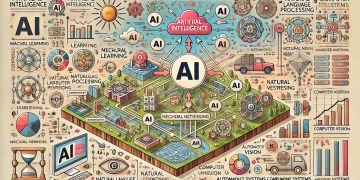Artificial Intelligence (AI) is revolutionizing the real estate industry by enhancing property management, automating transactions, optimizing pricing strategies, and improving customer experiences. As real estate markets become more dynamic and competitive, AI-powered solutions provide valuable insights and automation to streamline operations and decision-making. This article explores various use cases of AI in real estate and how it is reshaping the industry.
1. AI-Powered Property Valuation
AI-driven predictive analytics assess property values based on historical data, market trends, and location-based factors. Machine learning algorithms analyze property prices, neighborhood developments, and economic indicators to generate accurate valuations, assisting buyers, sellers, and investors in making informed decisions.
2. Smart Property Search and Recommendations
Real estate platforms use AI to enhance property search experiences by offering personalized recommendations. AI algorithms analyze user preferences, search history, and budget constraints to suggest properties that align with a buyer’s needs. Chatbots and virtual assistants further improve customer interactions.
3. AI in Real Estate Market Analysis and Forecasting
AI-driven models analyze economic trends, demographic shifts, and supply-demand dynamics to predict real estate market fluctuations. Investors and real estate firms use AI-powered insights to make data-driven investment decisions and anticipate future market conditions.
4. Automated Lease and Document Processing
AI automates lease management and document verification, reducing paperwork and administrative tasks. Natural Language Processing (NLP) extracts key information from contracts, ensuring compliance and minimizing legal risks. AI-driven platforms streamline lease agreements and transaction processing.
5. AI in Mortgage and Loan Processing
AI enhances the mortgage approval process by analyzing applicants’ credit scores, financial history, and risk profiles. AI-driven underwriting models assess risk factors more accurately, enabling faster loan approvals and reducing default risks for lenders.
6. AI-Powered Property Management and Maintenance
AI-driven property management systems monitor building conditions, detect maintenance issues, and predict repairs. Smart sensors and AI algorithms analyze data from HVAC systems, plumbing, and electrical units to optimize energy efficiency and minimize operational costs.
7. AI in Real Estate Investment and Portfolio Management
AI helps investors optimize real estate portfolios by analyzing asset performance, rental yields, and risk exposure. AI-powered investment tools recommend profitable properties, detect market opportunities, and automate portfolio rebalancing strategies.
8. AI-Driven Fraud Detection and Cybersecurity
AI enhances security in real estate transactions by detecting fraudulent activities, verifying property ownership, and preventing identity theft. AI-powered cybersecurity tools analyze transaction patterns and flag suspicious activities, ensuring secure real estate dealings.
9. Virtual Property Tours and AI-Powered Marketing
AI-driven virtual reality (VR) and augmented reality (AR) tools offer immersive property tours, enabling buyers to explore homes remotely. AI-powered marketing platforms use image recognition and predictive analytics to optimize property listings, target the right audience, and improve conversion rates.
10. AI in Sustainable Real Estate Development
AI contributes to sustainable building designs by analyzing energy efficiency, environmental impact, and smart infrastructure requirements. AI-driven models optimize urban planning, recommend eco-friendly materials, and improve resource utilization in real estate developments.
Conclusion
AI is revolutionizing real estate by improving efficiency, accuracy, and customer experiences. From property valuation to investment analytics and automated property management, AI-powered solutions are transforming the industry. As AI technology continues to evolve, real estate professionals must embrace AI-driven innovations to stay competitive and meet the evolving demands of buyers, sellers, and investors.
References
- Deloitte Insights. (2023). “AI in Real Estate: The Future of Property Technology.”
- Forbes. (2023). “How AI is Transforming Property Valuation and Investment.”
- McKinsey & Company. (2022). “AI-Driven Market Analysis in Real Estate.”
- PwC. (2023). “AI-Powered Smart Property Management Systems.”
- World Economic Forum. (2023). “The Role of AI in Sustainable Real Estate Development.”
- National Association of Realtors (NAR). (2022). “AI and Big Data in Real Estate Decision-Making.”




































